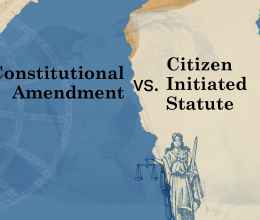Below is our Chief Lobbyist Gary Daniels' proponent testimony on House Bill 263. This was delivered to the House Commerce & Labor Committee on November 6, 2019.
To Chairwoman Manning, Vice Chair Dean, Ranking Member LePore Hagan, and members of the House Commerce & Labor Committee, thank you for this opportunity to present proponent testimony on House Bill 263, The Fresh Start Act of 2019.
You have previously heard from a wide range of proponents advocating for this bill, detailing its provisions, and explaining the positive benefits for your constituents. The ACLU of Ohio is pleased to briefly add its own support.
Unfortunately, under current laws and practices, far too many Ohioans are shut out of the labor market or are unable to obtain better jobs because of previous convictions. These are people who want to work, want to provide for themselves and their loved ones, and not experience any further troubles with the legal system.
However, Ohio places far too many barriers in their way. This is extremely unfortunate and counterproductive as we know one of the most crucial factors to prevent recidivism is adequate employment.
This is especially important in a state like Ohio where we convict and imprison so many of our citizens. Indeed, Ohio's prisons have been overcrowded for decades and many of our local jails are busting at the seams.
So, while HB 263 includes much welcome reforms, let us not forget it addresses only the back end of Ohio's mass incarceration crisis. The front end involves locking less people up and saddling less Ohioans with criminal records.
Unfortunately, as the Ohio General Assembly has been informed numerous times, Ohio's prison population appears poised to reach record numbers in the next few years. This is because oflast session's passage of SB 1 (dramatic increases in fentanyl-related penalties), and SB 201 (indefinite sentencing changes) as well as this session's SB 55 (to increase drug trafficking penalties).
This ongoing phenomenon of passing more bills to lock more people up for longer periods of time is what the ACLU of Ohio has coined the "Statehouse-to Prison Pipeline." Ifwe can end or severely reduce this pipeline, we can make bills like HB 263 and related efforts less necessary. Indeed, over 22,000 people were released from Ohio prisons in 2018. Many more were convicted but did not serve time. We ask that you always keep these factors in mind as you introduce and debate criminal justice-related bills.
More specifically, we also believe HB 263 and Ohio can benefit greatly from adding a data collection requirement. Data collection can reveal how effective HB 263 is after enactment, where improvements may need made, and if there are problems with individual licensing authorities. Without such data, we will not know exactly how effective HB 263 is. We have made HB 263's sponsor aware of this request.
Still, HB 263 is an easy bill for the ACLU of Ohio to support as it seeks to make Ohio better and safer via its focus on rehabilitation and community reentry and for the positive outcomes that will be enjoyed by Ohioans across the entire We hope members of this committee agree and we urge your support of House Bill 263.








